Awhile back, we offered advice on how to remove empty filler from your speech by minimizing how often you say “uh†and “um.â€
Today, we’re going to talk about removing another kind of filler from your speech (and your writing as well): empty words. Just like empty calories have the form of food but offer no nourishment to the eater, empty words take the form of verbiage, but offer no substance to the listener – leaving them hungry for meaning and details.
While “uh’s†and “um’s†can be eliminated altogether, empty words need to be replaced with heartier fare. Stocking your cupboard with such means building a large and varied vocabulary.
It seems like the only people who think about building their vocabulary are young adults who are preparing for standardized tests. Which is a shame, as expanding our vocabularies should be a lifelong pursuit. Why so? Because a command of words can benefit your life in many ways.
The Benefits of Building Your Vocabulary
Gives you the ability to say what you mean. Is your speech filled more with emotion than meaning? Is everything either “stupid†or “awesome?â€
The overuse of a word to describe a wide range of seemingly unrelated things saps it of any meaning. If a corn dog, a YouTube video, a job promotion, and the Great Wall of China are all “awesome,†then awesome ceases to have any meaning at all. Think of your vocabulary like the dial on an amp – if it’s always turned up to 11, you don’t have anywhere to go when trying to describe something truly impressive. Your only resort is to add empty intensifiers: “But seriously, it was really awesome.†The less you use what should be a meaningful word, the more potent it becomes (this goes for swear words too, by the way).
Conversely, a nimble working vocabulary gives you the ability to make finer and finer distinctions between things so that you can say exactly what you mean, and be explicit instead of vague when sharing your ideas and opinions or simply making conversation. This increases your chances of having other people understand what you wish to express, and at the same time it…
Helps you understand other people. Building your vocabulary involves more than just memorizing lists of the kinds of words you had to know for the SAT. Just as learning a second language can help you understand people from other countries, increasing your working vocabulary allows you to understand those who may share your mother tongue but also have a special “dialect†of their own. People’s fields of work and interests often come with special terminology that isn’t as commonly known. The more of these “special†words you learn, the greater the variety of people you can connect with.
Not only does a diverse vocabulary allow you to build rapport with a wide range of people, but knowing some medical, legal, and other technical/professional lingo can prevent you from being taken advantage of, and allow you to be proactive in your approach to dealing with doctors, lawyers, mechanics, customer service, and so on.
Helps you understand what you read. Vocabulary not only aids you in understanding other people, it’s also essential in comprehending the books and articles you read. Words you’re unfamiliar with become little holes in the text, preventing you from reaching a complete understanding of what you’re reading.
Assists you in becoming a more informed and involved citizen. Related to the two points above, the more you increase your vocabulary in general, and also specifically in areas like politics, geography, the military, and so on, the better able you become to understand news and currents events, and the more widely varied the conversations, discussions, and debates you can jump into. And when you do take part in a debate, you’ll be able to use – gasp! – facts, instead of heated bloviations.
Bolsters your ability to grasp ideas and think more logically and incisively. While we often think of our thoughts as shaping our words, it works the other way around as well. Think of words like a set of tools – a small vocabulary is like trying to carve a sculpture with only a chainsaw, versus using a whole set of different instruments that can make both broad and fine cuts. The greater the number of words at your disposal, the more instruments you have with which to hone your own ideas, and dissect and examine those of others.
Allows you to communicate effectively. A masterful command of words, and the ability to select just the right ones to express a specific idea, for a particular audience (more on this below), is essential in crafting powerful and engaging speech and writing. The repetition of the same words over and over again quickly bores people, while the skilled use of a wide array of them enables you to draw people in and paint a rich picture. This is why an expansive vocabulary is one of the keys for great leaders – words allow you to grab the interest, and then allegiance, of others.
And a robust vocabulary is just as important when you’re operating off the cuff as when your remarks are pre-planned – instead of hemming and hawing, searching for the right words to say, you can express yourself forcefully and with confidence.
Boosts your powers of persuasion. It’s hard to get people interested in an idea – whether a tangible product, a business pitch, or a piece of philosophy — and convince them of it unless you 1) understand it inside and out yourself, and 2) can describe it to others in an engaging way (see the two points above). Repeating the same word over and over again (“I’ve got this cool idea. See, it’s got this cool wheel here and then this really cool axle stick outs…â€) is going to have the eyes of your audience quickly glazing over. It certainly won’t help you sell them on something, or on yourself — issuing banalities in a job interview (“I’m a hard worker and a people person!â€) won’t do anything to set you apart from the myriad of other hard working, people-pleasing candidates.
Helps you make a good impression on others. How articulate you are constitutes a big part of the impression you make on others. Based on the vocabulary you use, people will make judgments about your socioeconomic background, education, occupation, and the stimulation and demands of your everyday life (a stay-at-home mom sometimes starts using baby language when talking with adults, while a professor may drop very academic terms into casual conversation).
It’s not a particularly unfair judgment to make. Your schooling, circle of friends, job, and reading habits do have a direct and considerable effect on your vocabulary. But that doesn’t mean that if you’re a construction worker or don’t have many years of schooling, that a sizable vocabulary is out of reach. Building your vocabulary is a very egalitarian pursuit: anybody can do it, and can start anytime.
Malcolm X serves as a great example of this, and many of the above points as well. His formal education ended in junior high, and as a young man he fell into a life of crime and was eventually arrested and put in prison for burglary.
As he recalled in his autobiography, behind bars X (then named Malcolm Little), came under the mentorship of a fellow prisoner, whose self-education Little envied, and who motivated him to get some “homemade education†for himself.
Little was particularly frustrated that he was unable “to express what I wanted to convey in letters that I wrote…In the street, I had been the most articulate hustler out there — I had commanded attention when I said something. But now, trying to write simple English, I not only wasn’t articulate, I wasn’t even functional.†Little was also vexed by his difficulty in reading: “Every book I picked up had few sentences which didn’t contain anywhere from one to nearly all of the words that might as well have been in Chinese. When I just skipped those words, of course, I really ended up with little idea of what the book said.â€
He was motivated to turn this around for himself, and so requested some tablets, pencils, and a dictionary from the prison. After rifling through the dictionary’s countless pages, amazed at the number of words he didn’t know and confused about which he needed to learn, Little turned to the first page of entries and started slowly and painstakingly copying each and every one of them by hand, “down to the punctuation marks.†It took him a whole day to inscribe one page, after which he read the words back to himself over and over again.
Malcolm woke up the next morning “thinking about those words — immensely proud to realize that not only had I written so much at one time, but I’d writÂten words that I never knew were in the world. Moreover, with a little effort, I also could remember what many of these words meant. I reviewed the words whose meanings I didn’t remember.â€
He repeated the same process over and over again, going page by page through the dictionary copying every single word, until finally he had copied the entire tome. This exercise did not take long to bear the prisoner rich fruits:
“I suppose it was inevitable that as my word-base broadened, I could for the first time pick up a book and read and now begin to understand what the book was saying. Anyone who has read a great deal can imagine the new world that opened.â€
Little became a voracious reader, devouring every book the prison library had to offer. Once he had served out his sentence, his vocabulary studies transformed him into an articulate speaker, known for his incisive rhetoric. Even those who didn’t agree with what he had to say were impressed with how he said it. As he himself recalled, “Many who today hear me somewhere in person, or on television, or those who read something I’ve said, will think I went to school far beyond the eighth grade. This impression is due entirely to my prison studies.â€
The good news here is not only that anyone who has the discipline and motivation to build their vocabulary can succeed, but there’s a much easier way of doing it than copying down the entire dictionary!
The 5 Easy Steps to Building Your Vocabulary
There are a lot of good strategies for building your vocabulary — learning the meaning of suffixes, prefixes, and roots of words, going through word lists and making flash cards for the words you don’t know, and signing up for a daily “Word of the Day†email from a website like Merriam-Webster.com, to name a few.
But since I personally find it hard to motivate myself to study etymology, considered my flash card days over when I left law school, and know I wouldn’t open my Word of the Day email consistently (despite a pang of guilt each time), let me share my favorite vocabulary-building method. It’s a simple and classic one that helps you build your vocabulary gradually and naturally – without too much extra exertion. While it’s been around a long time, I first discovered it through one of those old cheesy, but wise, instructional films that I love:
Here’s how it works:
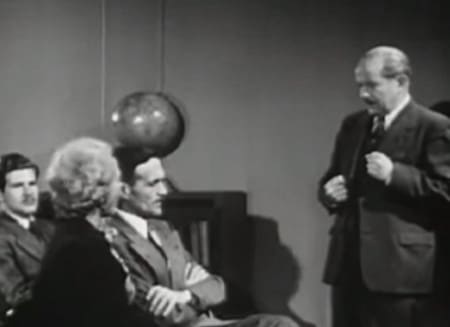
The slow but earnest Mr. Willis tries to advocate for the building of a park, but has trouble expressing himself. In fact, the lady on the left was heard to mutter, “Whatcha talkin’ about Willis?”
1. Read. Reading is the single biggest thing you can do to increase your vocabulary (and of course it offers a whole host of other benefits as well). Without specifically trying to study vocabulary, you encounter tons of new words, the meaning of which you can often glean from the context in which the word is situated (although you shouldn’t rely exclusively on context – see below). Reading offers not just an awareness of words, but a real feel for them.
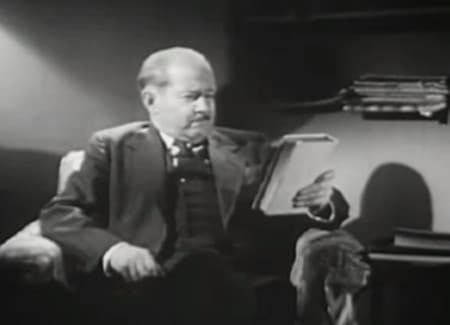
Mr. Willis takes up reading to boost his vocabulary — checking out books on everything from home decorating to his printing business.
The broader and more challenging your reading selections, the beefier your working vocabulary will become. Strive to read both nonfiction and fiction. Instead of only browsing content-aggregator sites, read entire articles in high-caliber newspaper like The New York Times or The Wall Street Journal, and magazines like The Atlantic. Also dip into periodicals on different kinds of subjects like The Smithsonian or Scientific American.
2. Listen. You can also pick up new words from the people you talk with and listen to. This is, after all, exactly how you learned words back when you were a toddler. Our son Gus is always picking up new words from things we say, trying to figure out the context, and then trying them out himself (it’s excellent motivation to curb your cursing!). Sometimes he gets it right, sometimes he gets it wrong – often to comedic effect.
Of course, the effectiveness of this listen-to-learn method depends on who you surround yourself with. Challenge yourself by associating with well-educated people, watching interesting lectures, and taking the harder classes in school, even if doing so makes you uncomfortable. Iron sharpens iron, and the vocabulary of those with keens minds will rub off on you.
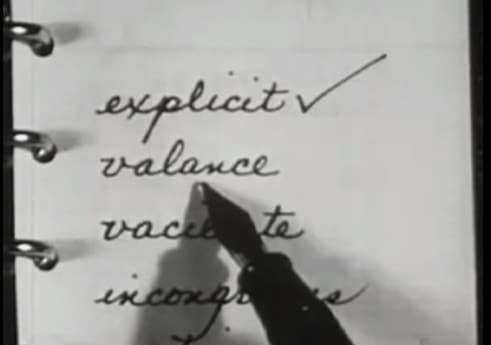
Mr. Willis begins to jot down words he hears and reads that he doesn’t know the meaning of.
3. Write down words you read and hear that you don’t know. Reading and listening are the ways you expose yourself to new words. Once someone uses a word you’re unfamiliar with, or you come across a new word while reading, write it down in a pocket notebook (or your smartphone).
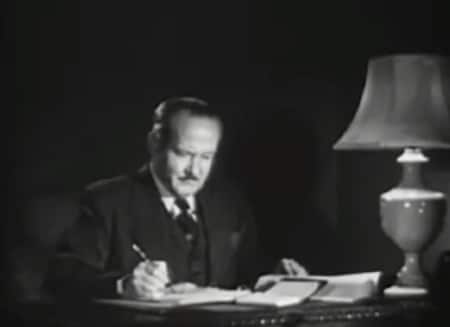
Mr. Willis transfers his new word list to a special vocabulary notebook.
4. Look up the word in a dictionary and write down its meaning in a vocabulary notebook. Whenever you hear or read a new word, you should always stop and try to figure out its meaning from the context in which it is given. But a word can have multiple meanings and shades of meaning, the author or speaker could possibly have used the word incorrectly, and even if you do guess the right meaning, you may quickly forget it. So don’t stop there. Once you get a chance, look up the new word you wrote down in your pocket notebook in a dictionary (new dictionary apps make doing this possible on the go), and then write it and its definition in a larger notebook dedicated to learning new vocabulary. Keep the definition short and put it in your own words – you don’t really understand something if you can’t explain it yourself.
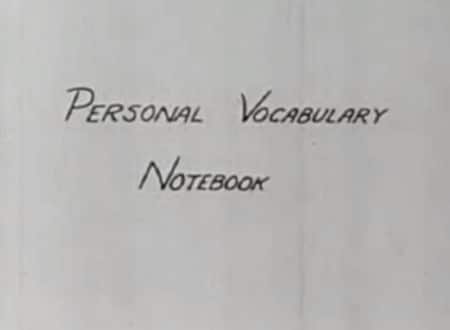
You can customize yours with some cool stickers.
It’s also important to jot down the pronunciation of the word – not with fancy symbols, but phonetically in a way you will understand. For example, for the word “oblique,†you could write its pronunciation as “oh-bleek.†What’s great about the advent of online dictionaries is that they often have a button to click to hear the word being spoken aloud. Knowing how to correctly pronounce a word is crucial – dropping big words into conversation, but saying them incorrectly is worse than not saying the words at all. Once you’ve written down the proper pronunciation, say the word aloud several times.
You might also write down some of the word’s synonyms, and even draw a picture that can help you remember its meaning.
5. Use the new word several times in conversation as soon as you can. This will really help sear the word into your mind.

Mr. Willis redoes his presentation, this time dropping in words like “vacillate” and “ultimatum” and the crowd goes wild. Way to go Mr. Willis!
Catering Your Vocabulary to Your Crowd
Once you start building your vocabulary, you may be tempted to throw out the big words you’ve learned every chance you get.
But just as important as expanding your vocabulary, is learning to use it appropriately. A large vocabulary is not accumulated for showing off; it’s a tool that allows you to communicate more effectively. Using the wrong vocabulary at the wrong time negates this function.
If you use big, uncommon words with your friends while watching a football game, they might not understand you, and definitely will think you’re putting on airs. Ditto for when you’re first getting to know someone — a purposeful display of your large vocabulary will make people think you’re smug and pretentious. At the same time, you don’t want to fill your speech with slang words when you’re being considered by a panel of faculty for a professorship. And while you do want to use technical terms when discussing your invention with fellow scientists, you don’t when trying to sell your idea to a layman venture capitalist.
You get the idea. Cater your vocabulary to the circumstances and pick words that will allow you both to express yourself and make yourself understood, while being engaging and setting your listener at ease. Never assume a shared vocabulary and know your audience!
Finally, always remember Mark Twain’s famous admonition to not “use a five-dollar word when a fifty-cent word will do.†And occasionally, even using a nickel piece is fine; if “awesome†or “epic†really is the best word to describe how you feel about something, then go for it – pompous vocab police be damned.
Further Reading



